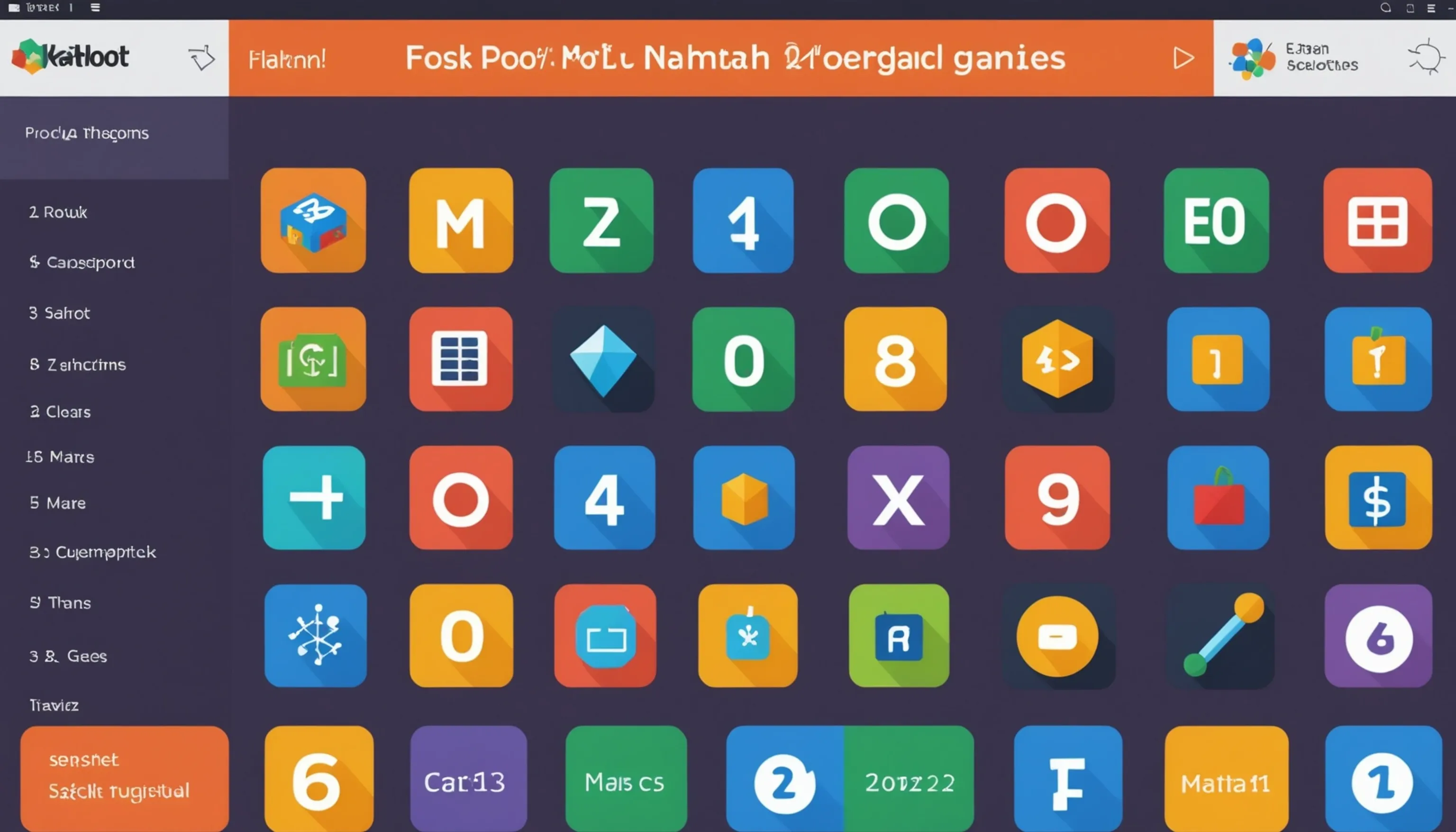Free Math Games for Classrooms
 HvWHenry van Wagenberg
HvWHenry van Wagenberg
Top Free Math Games for Classrooms
In today's digital age, incorporating free math games into classrooms can significantly enhance students' engagement and understanding. These games make math enjoyable and interactive, which is essential for teenagers who may find traditional methods tedious. Some of the top free math games include Kahoot!, where students can participate in fun quizzes, and Prodigy, an adventure-based game that aligns with math curricula.
Additionally, platforms like Coolmath Games offer a variety of math challenges tailored for different skill levels. By utilizing these games, teachers can create a dynamic learning environment that fosters both competition and collaboration.
Benefits of Using Math Games in Education
Using math games in education offers numerous benefits that can transform the learning experience for students. One of the primary advantages is increased engagement. Traditional teaching methods can often lead to boredom, especially for teenagers. However, when math is presented through games, students are more likely to participate actively and enjoy the learning process.
Another significant benefit is the development of critical thinking skills. Many math games encourage problem-solving and strategic thinking, allowing students to approach math challenges in innovative ways. This fosters a deeper understanding of mathematical concepts, as students learn to analyze situations and make decisions based on their reasoning.
Moreover, math games promote collaboration among peers. Students often work in teams or compete against each other, which encourages communication and teamwork. These social interactions not only enhance learning but also help build essential life skills.
Additionally, math games provide immediate feedback, which is crucial for effective learning. Students can quickly see where they went wrong and understand the correct solutions, allowing them to learn from their mistakes in real time.
Finally, integrating math games into the classroom can accommodate various learning styles. Whether a student is a visual learner, auditory learner, or kinesthetic learner, there are games designed to suit different preferences. This inclusivity ensures that all students have the opportunity to grasp mathematical concepts effectively.
How Math Games Enhance Learning
Math games enhance learning by creating an interactive and stimulating environment that captivates students' attention. One primary way they achieve this is through gamification, which transforms traditional lessons into fun and engaging activities. This approach motivates students to learn, as they often associate games with enjoyment rather than a chore.
Furthermore, math games help reinforce essential concepts. By integrating practice with play, students can repeatedly engage with specific math skills, such as addition, subtraction, or fractions, making it easier to retain information. For instance, a game that requires players to solve problems to advance can solidify their understanding through repetition.
Additionally, these games promote self-paced learning. Students can progress through challenges at their own speed, allowing them to take the time they need to grasp difficult concepts without the pressure of a traditional classroom setting. This individualized approach caters to different skill levels, ensuring that all students can benefit.
Moreover, math games encourage risk-taking and resilience. When students encounter challenges or make mistakes during gameplay, they learn to persevere and develop problem-solving skills. This builds a growth mindset, as they understand that effort and practice lead to improvement.
Lastly, math games can foster a sense of community in the classroom. Collaborative games enable students to work together, share strategies, and celebrate each other's successes, creating a supportive learning atmosphere that enhances overall educational outcomes.

Popular Free Math Games for Teens
There are several popular free math games that cater specifically to teenagers, making math fun and interactive. Kahoot! is a favorite, featuring quizzes where students can compete against peers in real-time. Prodigy combines math practice with an engaging adventure game, allowing students to solve problems to progress through levels. Math Playground offers a variety of math challenges and puzzles that help reinforce skills while keeping players entertained. Additionally, Coolmath Games provides numerous math-related games that range from strategy to logic, ensuring that teens can enjoy learning while playing.
Kahoot! - Engaging Math Quizzes
Kahoot! is a widely recognized platform that transforms traditional learning into an exciting quiz game, making it particularly effective for teaching math concepts. It allows teachers to create engaging and interactive quizzes that can be played in real-time, either in the classroom or remotely. This platform encourages student participation by fostering a sense of competition, as players can see their scores on a leaderboard, which adds an element of fun.
One of the key benefits of using Kahoot! for math quizzes is its versatility. Educators can customize quizzes to target specific math topics, from basic arithmetic to complex algebra and geometry. This adaptability ensures that quizzes align with the current curriculum, allowing teachers to assess students' understanding effectively.
Moreover, Kahoot! promotes collaborative learning. Students can work in teams, discussing answers and strategies, which enhances their communication skills and fosters teamwork. This collaboration not only makes learning more enjoyable but also helps students learn from one another.
In addition to promoting engagement and collaboration, Kahoot! provides immediate feedback. After each question, students can see whether they answered correctly, allowing them to learn from their mistakes on the spot. This instant feedback loop is crucial for reinforcing concepts and encouraging continuous improvement.
Overall, Kahoot! is an innovative way to make math quizzes exciting and educational, keeping teens motivated and actively involved in their learning journey.
Prodigy - A Fun Math Adventure
Prodigy is an innovative and interactive math game designed to make learning math a fun adventure for students, especially teenagers. This engaging platform combines elements of gaming with a comprehensive curriculum, allowing students to practice their math skills in an immersive fantasy world. Players create their own characters and embark on quests, solving math problems to advance through various challenges and unlock new areas.
One of the standout features of Prodigy is its adaptive learning technology. The game tailors questions to each student's skill level, ensuring that they are consistently challenged without becoming frustrated. As students progress, the game dynamically adjusts to provide appropriate difficulties, making it suitable for diverse learning abilities.
Moreover, Prodigy emphasizes mastery. Students must demonstrate their understanding of a concept before they can move on, promoting a deeper comprehension of mathematical principles. This focus on mastery helps build confidence, as students are encouraged to revisit and refine their skills.
Additionally, Prodigy includes a reporting feature that allows teachers and parents to monitor progress. This data provides insights into areas where students excel or struggle, enabling targeted support and intervention where needed.
Furthermore, Prodigy fosters a sense of community, as students can challenge their friends and classmates, adding an element of friendly competition. Overall, Prodigy makes math enjoyable and engaging, encouraging students to embrace learning while developing essential skills.

Coolmath Games - A Variety of Math Challenges
Coolmath Games is a popular online platform that offers a wide array of math challenges designed to make learning math enjoyable and entertaining for students, particularly teenagers. With its vibrant graphics and engaging gameplay, Coolmath Games has become a go-to resource for educators and students seeking to enhance their math skills in a fun way.
The platform features a diverse selection of games that cover various mathematical concepts, including logic puzzles, strategy games, and arithmetic challenges. This variety allows students to choose games that align with their interests and learning styles, ensuring that they remain engaged and motivated throughout the learning process.
One of the key benefits of Coolmath Games is its focus on critical thinking and problem-solving. Many of the games require players to think strategically and plan their moves, fostering essential cognitive skills that are crucial not only in math but in everyday life as well. For instance, games that involve planning and resource management can help students develop their analytical abilities.
Additionally, Coolmath Games allows for self-paced learning, giving students the freedom to explore math concepts without the pressure of traditional classroom settings. This autonomy can lead to improved confidence as students master new skills at their own speed.
Overall, Coolmath Games serves as an excellent resource for teachers and parents looking to supplement math education with interactive and enjoyable challenges. By incorporating these games into their learning routines, students can develop a positive attitude towards math while honing their skills in a playful environment.
How to Integrate Math Games into the Classroom
Integrating math games into the classroom can significantly enhance student engagement and understanding. Here are some effective strategies to do so:
- Identify Learning Objectives: Choose games that align with specific math concepts and skills you want to reinforce.
- Incorporate Technology: Utilize online platforms like Kahoot! or Prodigy for interactive gameplay that can be played on devices.
- Schedule Regular Game Time: Designate specific days for math games, making it a routine that students look forward to.
- Encourage Collaboration: Organize students into teams to foster teamwork and communication while playing.
- Monitor Progress: Use game analytics to track student performance and identify areas needing improvement.
By thoughtfully incorporating math games, teachers can create a dynamic learning environment that fosters enthusiasm for mathematics.
Creating a Game Schedule
Creating a game schedule is essential for effectively integrating math games into the classroom, ensuring that students benefit from consistent practice while enjoying the learning process. Here are some steps to develop a successful game schedule:
1. Assess Learning Objectives: Begin by identifying the specific math concepts you want to reinforce, such as fractions, geometry, or problem-solving skills. This will help you select suitable games that align with your curriculum.
2. Determine Frequency: Decide how often you want to incorporate math games into your lessons. This could be once a week, bi-weekly, or even daily, depending on your teaching style and the students' needs.
3. Allocate Time: Set aside dedicated time slots for game sessions. Whether it’s a short 15-minute session at the end of the class or a longer period during math lessons, consistency is key.
4. Rotate Games: To keep students engaged, rotate through different games regularly. This not only prevents boredom but also exposes students to various math concepts and skills.
5. Communicate the Schedule: Share the game schedule with students and parents. Keeping everyone informed fosters excitement and encourages participation.
By thoughtfully creating a game schedule, teachers can effectively incorporate math games into their teaching, enhancing students' learning experiences while making math enjoyable.
Encouraging Friendly Competition
Encouraging friendly competition in the classroom can significantly enhance student engagement during math games. Here are several strategies to foster a positive competitive atmosphere:
1. Establish Clear Rules: Begin by setting clear guidelines for competition. Explain how scores will be calculated and what constitutes fair play. Ensuring that students understand the rules helps maintain a respectful environment.
2. Create Teams: Divide students into small teams to encourage collaboration while fostering a sense of camaraderie. Team-based competitions can help students learn from one another and build relationships.
3. Use Leaderboards: Implement a leaderboard to track scores and progress. Displaying results fosters motivation and encourages students to strive for improvement. Make sure to celebrate not only the top performers but also those who show significant progress or effort.
4. Recognize Achievements: Acknowledge both individual and team accomplishments. Consider awarding small prizes, certificates, or even just verbal recognition to boost morale and encourage continued participation.
5. Promote Sportsmanship: Emphasize the importance of sportsmanship. Remind students that the goal is to learn and have fun, rather than just winning. Encourage them to support their peers, regardless of the outcome.
By fostering an environment of friendly competition, teachers can make math games more engaging while helping students develop valuable social skills and a positive attitude toward learning.
Using Games for Different Math Topics
Using games for different math topics is an effective way to enhance learning and maintain student engagement. Here’s how to effectively incorporate games across various mathematical concepts:
1. Arithmetic Games: For foundational skills like addition, subtraction, multiplication, and division, consider games like Kahoot! or online math flashcards. These can provide quick drills and reinforce basic skills through fun quizzes that encourage speed and accuracy.
2. Geometry Challenges: Utilize games that focus on shapes, angles, and spatial reasoning. Platforms like Coolmath Games offer puzzles that require students to manipulate shapes and solve geometry-based problems, making learning interactive and enjoyable.
3. Algebra Activities: Engage students with games that involve solving equations or inequalities. Websites like Prodigy allow students to tackle algebraic problems within an adventure game format, making complex topics more approachable.
4. Data and Probability: Incorporate games that teach statistics and probability concepts. Use real-world scenarios, such as games involving dice or cards, to illustrate chance and data analysis. Students can collect and analyze data from these activities, enhancing their understanding of statistical concepts.
5. Word Problems: Create escape room-style challenges where students must solve word problems to advance. This approach encourages critical thinking and helps students apply their math skills in practical situations.
By utilizing games tailored to different math topics, teachers can create a dynamic learning environment that caters to diverse learning styles and keeps students engaged.
